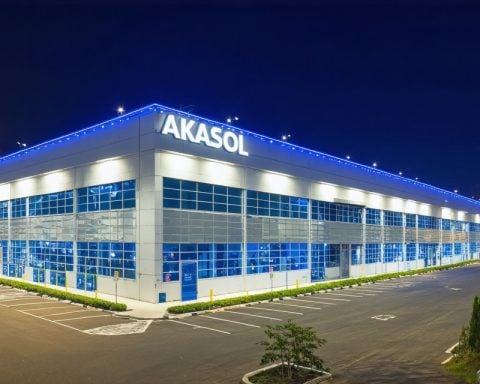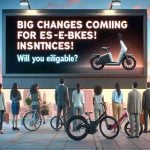Facing the Future: The Electric Bus Industry Beyond Joliet
The sudden pause at the Lion Electric factory in Joliet, Illinois, where plans promised the production of 10,000 electric buses annually, prompts a reconsideration of the reality facing future green energy initiatives. Over 50% of the workforce now find themselves without jobs, underscoring concerns about the project’s viability and broader implications for the electric vehicle (EV) industry.
Unveiling Financial Uncertainties
Fundamental to this unfolding situation is the question of financial governance, particularly regarding the use of taxpayer funds. With ample tax incentives fueling the Lion Electric venture, scrutiny now turns to whether such substantial public investment was merited. Stakeholders and residents alike seek transparency to gauge whether these green ambitions justify the expense.
Navigating Industry Challenges
The troubles faced by Lion Electric echo through the broader green energy landscape. Companies like Rivian also grapple with unexpected hurdles in the push towards electrifying transportation. What becomes apparent is the need to assess the scalability and sustainability of these initiatives—critical questions that the current scenario brings sharply into focus.
Charging Infrastructure: The Missing Link
The factory’s shutdown coincides with a sluggish rollout of the much-needed electric vehicle charging infrastructure across Illinois, a promise yet to be fully realized by local leaders. This gap hinders the widespread adoption of electric transport, casting doubt on the market’s ability to sustain long-term growth.
Future Outlook
The consequences of the Joliet factory’s suspension ripple through the EV market, illustrating the precarious nature of green technology investments. Observers will closely monitor developments in:
– Innovative Technologies: With breakthroughs in battery and drivetrain tech poised to change the landscape.
– Legislative Impact: Future state policies will dictate the fate of similar projects and the broader environmental agenda.
Balancing Ambition with Reality
For an industry striving for sustainability, aligning financial solvency with environmental goals is paramount. The experience in Illinois serves as a reminder of the complexities involved in achieving a green future.
The halted operations at the Lion Electric plant highlight the mixed expectations facing the green energy sector. As discussions advance, the need for informed, strategic decisions becomes clearer, ensuring that ambition is matched by practical, achievable outcomes.
The Ripple Effect of Electric Bus Production Stalls on the Environment and Beyond
The recent pause in production at Lion Electric’s Joliet, Illinois plant, initially slated to deliver 10,000 electric buses annually, spotlights crucial challenges facing green energy initiatives today. This event, where over 50% of the workforce faces unemployment, underscores the delicate balance between ambition, economic viability, and environmental impact within the electric vehicle (EV) industry.
Environmental Impact and the Path to Sustainability
Electric buses, touted as a cornerstone in reducing urban air pollution and greenhouse gas emissions, offer a vision of cleaner cities and healthier populations. The delay at the Joliet plant, however, could have significant repercussions for environmental progress. The planned production of 10,000 buses was poised to take a substantial number of diesel and gasoline-powered buses off the roads. With the wheels of production halted, emissions in urban areas may remain unchanged, dampening efforts to combat climate change and achieve cleaner air standards.
Furthermore, the incomplete development of EV charging infrastructure, as highlighted in the Lion Electric scenario, points to an essential missing link in the environmental equation. Without adequate charging facilities, the incentive for cities and transit authorities to transition to electric buses diminishes, thereby slowing the environmental benefits expected from widespread EV adoption. This gap perpetuates reliance on fossil fuels, extending the timeline for achieving significant ecological improvement.
Societal and Economic Ripples
The job losses at the Joliet plant highlight how closely intertwined green energy initiatives are with local economies and communities. The sudden unemployment of a majority of the workforce reflects broader socioeconomic challenges as industries pivot towards sustainable technologies. As green jobs become a cornerstone of the future economy, ensuring stability and proper planning in these sectors will be vital to prevent such disruptions.
From an economic standpoint, the financial uncertainties surrounding taxpayer investments in projects like Lion Electric raise questions about resource allocation and fiscal responsibility. Missteps in these areas can lead to public skepticism, potentially hindering future investments in renewable projects essential for climate goals. Ensuring transparency and accountability in these ventures will be crucial in maintaining public support and ensuring a just transition to a sustainable economy.
Implications for Humanity’s Future
The case of the Joliet plant emphasizes the need for strategic alignment between innovative green technologies and robust economic planning. For humanity, this alignment is critical in navigating the transition to sustainable urban living. Electric buses and vehicles play an integral role in reducing transportation emissions, leading to healthier living conditions and contributing to the global effort to mitigate climate change.
Looking forward, the lessons learned from Joliet underscore the necessity for comprehensive planning that incorporates infrastructure, technological advancements, and economic resilience. Addressing these components can strengthen future projects, ensuring they contribute positively to the environmental agenda and support community and economic development.
The delay in Joliet serves as both a cautionary tale and a catalyst for reassessment. As the world moves closer to a sustainable future, these experiences will shape policies and initiatives that aim to balance innovation with practical, grounded realities. Maintaining this balance is vital for ensuring that the green transition benefits the environment, society, and the economy alike, securing a prosperous and sustainable future for generations to come.
Electric Bus Industry Pivots: New Challenges and Innovations Post-Joliet
Emerging Trends and Insights in the Electric Vehicle Industry
The recent halt in operations at the Lion Electric factory in Joliet, Illinois, highlights a significant moment for the electric bus industry and the broader electric vehicle (EV) market. While the promise of producing 10,000 electric buses annually now seems uncertain, the situation brings to light emerging trends, financial concerns, and the potential for innovation within the industry.
Financial Challenges and Scrutiny of Public Investment
The reliance on tax incentives for supporting EV projects like Lion Electric raises questions about financial governance. Stakeholders are increasingly demanding transparency in how public funds are utilized, questioning whether such investments truly advance the green agenda or merely pose financial risks without substantial returns. The debate continues over balancing ambition with fiscal responsibility and ensuring taxpayer money significantly impacts the transition to sustainable energy sources.
Role of Charging Infrastructure in EV Growth
A critical component missing from the success of electric bus initiatives is the widespread development of charging infrastructure. The slow progress in Illinois reflects a national challenge in creating a robust network of EV charging stations. Addressing this gap is crucial for supporting the expansion of electric transportation and ensuring the viability of electric buses in daily public transit operations.
Innovations and New Technologies on the Horizon
Despite the setbacks, the electric vehicle industry is witnessing promising innovations, particularly in battery technology and sustainable materials for vehicle manufacturing. Advancements in these areas could substantially reduce costs and increase the efficiency and range of electric buses, making them more appealing to municipalities and transportation operators.
Legislative Influences and Future Policies
As states and federal governments reevaluate transportation policies, new legislation could accelerate the adoption of electric buses or hinder progress through stringent regulations. The EV industry’s future largely depends on lawmakers’ ability to create favorable conditions for innovation while maintaining environmental and financial sustainability.
Industry Comparisons and Market Analysis
Comparing companies like Lion Electric and Rivian reveals varied approaches to scalability and growth. Some firms invest heavily in expanding production capacities, while others focus on strategic partnerships and gradual market entry. A thorough market analysis indicates that flexible business models capable of adapting to rapid technological changes and evolving consumer demands are likely to thrive.
Conclusion: Strategic Planning for a Greener Future
The sudden pause at the Lion Electric factory signifies more than just operational hiccups; it underscores the need for strategic planning and realistic evaluations of green projects. As the industry moves forward, maintaining a balance between environmental aspirations and economic viability will be crucial. For more insights on electric vehicle trends and business strategies, consider visiting EVgo.


















